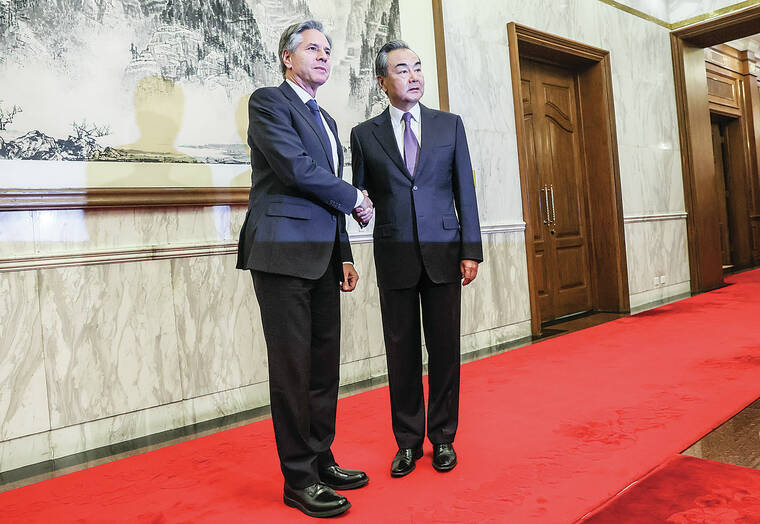Blinken’s China trip yields best possible result: more talks
Secretary of State Antony Blinken got a muted reception when he arrived in Beijing: a lone Foreign Ministry official there to meet him and no red carpet, just red lines on the runway that social media users joked were a symbol of China’s unwillingness to compromise on issues like Taiwan.
But as he left less than 48 hours later, Blinken said the trip had achieved its goal because the two sides had restored some senior-level communications. President Xi Jinping pronounced the progress “very good,” warm words from a taciturn leader who held off confirming a meeting with Blinken — the highest-level U.S. official to visit Beijing in five years — until the last minute.
ADVERTISING
The most positive outcome was the pledge to keep talking, including a plan for Chinese Foreign Minister Qin Gang to visit Washington in the next few months. U.S. officials such as Treasury Secretary Janet Yellen and climate envoy John Kerry are also expected to travel to China soon.
Beyond that, the discussions yielded few specific takeaways. The two sides discussed increasing passenger flights and the need for more exchanges between students and business leaders, though offered nothing concrete. And the U.S. didn’t get the one thing it really wanted: restored communications between the two countries’ militaries that China severed after then-House Speaker Nancy Pelosi visited Taiwan last August.
‘Notable gaps’
That resuming some conversations counted as success was yet another sign of how sour the relationship has become between the world’s two largest economies. Threats lurk in every corner that could derail even this modest progress: Taiwan, human rights, the origins of the coronavirus pandemic, semiconductor policy and so many other issues.
“If you look at the realistic expectations that Blinken and his team set out for the visit, they were achieved and frankly, you could say even exceeded,” said Wendy Cutler, a veteran U.S. diplomat and trade negotiator. “That said, when you parse through what was publicly announced, there are some notable gaps, including what the next steps will be beyond the reciprocal visit of the foreign minister to the United States.”
Given the current state of ties, with former Secretary of State Henry Kissinger warning of possible military conflict if there’s no course correction, regular meetings are at least likely to reassure countries in the region worried about a potential war. The Blinken visit sets the stage for a possible Biden-Xi meeting at the Group of 20 summit in India in September and smooths the way for the Chinese leader to visit the U.S. for the Asia Pacific Economic Cooperation forum in November.





